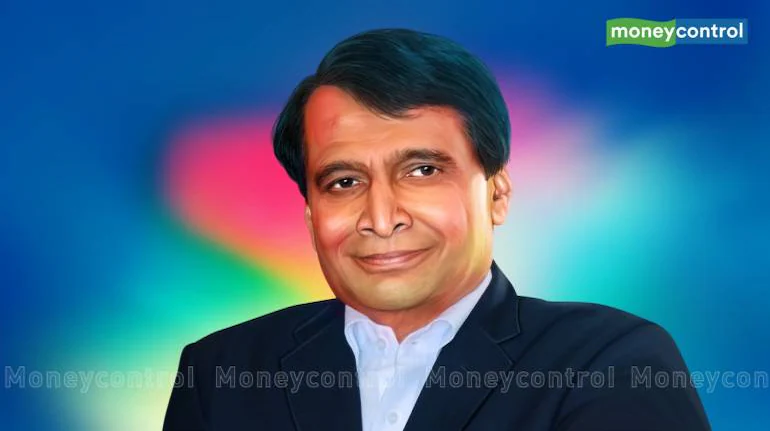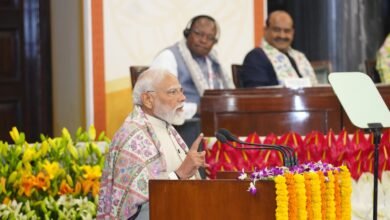
Former Union Minister,Chancellor of Rishihood University,CA Shri Suresh Prabhakar Prabhu:-Education system will have to become mentor and enabler as AI(Artificial Intelligence) grows:
Educational institutions will need a sharp shift from being ‘teaching’ institutions to ‘learning’ institutions,Honourable Shri Suresh Prabhakar Prabhu,CA, former Union Minister for multiple ministries,India’s former Sherpa for G-7 and G-20 countries and Chancellor of Rishihood University told Moneycontrol in an exclusive interview by Shri ABHISHEK SAHU .
Given the rapid growth of artificial intelligence (AI), it is reasonable to anticipate a significant transformation in education,Shri Suresh Prabhu, former Union Minister and currently the Chancellor of Sonipat-based Rishihood University, told Moneycontrol, in an exclusive interview.
He said the existing education system must transition into the role of mentor and enabler, moving beyond its traditional function as a mere provider of information.
Edited excerpts:
The government has allowed foreign universities to operate in India. Do you think it will act as an advantage for private universities to have competitors from abroad?
It is overall good for the higher education ecosystem because foreign universities will bring faculty as well as methodologies. Competition will increase both in terms of recruiting students as well as faculty, thereby pushing the university system to continuously strive for better. Opportunities to collaborate and provide inter-disciplinary and inter-country programs will also increase. Thus, overall it is a move that will improve the quality of higher education.
How do you see the changing trends in the education space with the advent of ChatGPT and AI?
It is for the first time that technology is offering such a high level of personalisation and interaction. With the pace with which AI is growing, it is safe to assume that a lot of education will change because it enables personalised learning that can be anywhere, anytime, at any pace, on any topic. The incumbent education system will have to play the role of a mentor and enabler, rather than just an information provider.
How do you think faculties need to train and evolve to tackle changing trends in the education space – ChatGPT, AI, ML etc?
Educational institutions will need a sharp shift from being ‘teaching’ institutions to ‘learning’ institutions. Thus, faculties will have to do a mindset shift of enabling a culture of learning rather than simply imparting knowledge. Developing the attitude of asking the right questions, going to first principles, finding the right content and applying it will become more important than finishing a curriculum or assessing the memory of the students.
There is a perception that traditional firms in India still prefer degrees from top-notch colleges over skills. What do you think India’s private universities are lacking?
Students from top colleges are preferred by recruiters because they have demonstrated a certain amount of hard work and intellectual acumen to get there. Indeed, they are not necessarily being recruited for skills because the colleges often don’t cover those skills in the curriculum that are required by the particular recruiter, for example, IIT graduates getting into banking and consulting.
The comparison here is not private versus public. There are institutions like BITS which are better than most public institutions of India. Even globally, some of the top universities are private. So the basic parameter is the quality of incoming students, of faculty, and of the learning culture of that institution.
What is your vision for India as an education hub in the next five or ten years?
As the fastest-growing economy and the youngest population, India is in an opportune and responsible position to provide for the talent needs of the world. Countries ranging from Germany to Japan are partnering with India to create employment opportunities for Indians.
Therefore, both for our domestic requirements and global workforce situation, India will emerge as the education hub. The National Education Policy is a positive step to improve the quality and availability of education in India.
How do you envision Rishihood University in the coming decade?
Rishihood is an impact university. We are seeing an emerging curiosity and aspiration in young students to make a positive difference in the world. They are not just looking at stable careers but meaningful life and social impact. This is why we as educators have to relook at our role in the changing times and changing aspirations.
With our practical education that encompasses intellectual, physical, emotional and spiritual dimensions of learning, we are excited to see how our work unfolds over the next decade and establish a robust model of holistic education.
This interview courtesy MoneyControl is by Shri ABHISHEK SAHU . Shri sahu covers HR and Education (Careers) at Moneycontrol. He can be reached at Abhishek.Sahu@nw18.com and @Abhishek44sahu.
FIRST PUBLISHED: DEC 7, 2023






